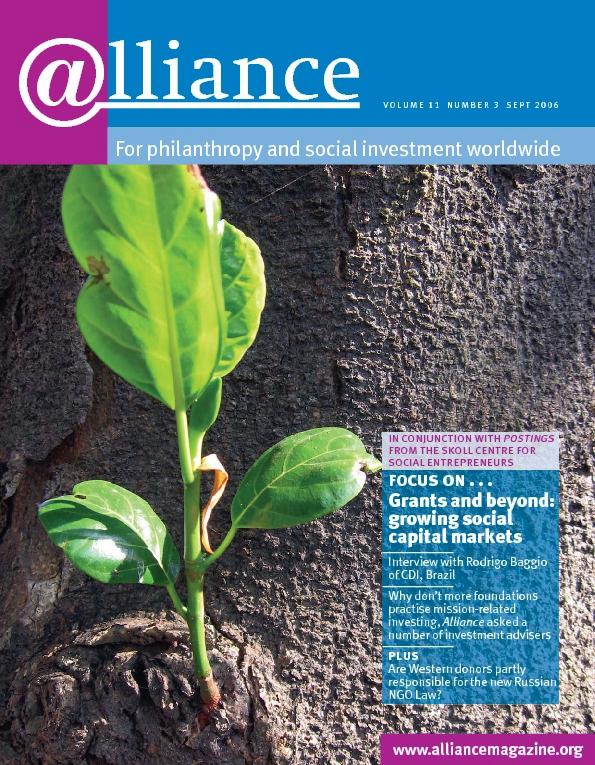At first sight, an ‘industrial park’ in Uganda, a group of low-income women manufacturing soap in Cameroon, a dressmaker in Dar es Salaam selling into the US, and mango growers on the Kenyan coast may seem to have nothing in common, but all are beneficiaries of trusts fostered by the UK’s Gatsby Charitable Foundation during the last 15 years. Each of the Trusts would probably be able to sustain their activities even without ongoing core funding from Gatsby’
The trusts (in Uganda, Cameroon, Tanzania and Kenya) were established because the Trustees of the Gatsby Foundation felt that much aid designed and controlled by official donors was becoming increasingly dysfunctional, that it was important to assist in building an institutional base for local philanthropy, and that a successful small-scale enterprise sector was critical to Africa’s economic development.
Each of the trusts is governed by a board of local trustees and they are registered as legal entities under national legislation with dual status as trusts and NGOs and with appropriate tax-free status. The trusts now have an average annual budget of about €1 million; they continue to received modest core funding from the Gatsby Foundation but in three cases have managed to access significant project-type funding from other sources.
Although the common initial theme was support for small-scale enterprise, the trusts have interpreted this in different ways and now have significantly different strategies and products. The Cameroon Gatsby Foundation is entirely engaged in microfinance for low-income women in both rural and peri-urban areas (adding technical assistance and market access to the finance); the Tanzania Gatsby Trust is both a ‘wholesaler’ of funds to other microfinance NGOs and runs its own women’s microfinance programme, as well as having a very comprehensive technical assistance programme with an emphasis on accessing regional and international markets; the Kenya Gatsby Trust has as its prime focus the identification of opportunities along product value chains and the ways in which SMEs can take advantage of them. It is working with a number of larger-scale business partners to develop these opportunities. The Uganda Gatsby Trust is engaged in an outreach programme from the Faculty of Technology in the University of Makerere. This works through ‘Gatsby Clubs’ in 21 Ugandan towns and now incorporates more than 1,500 medium-scale SMEs, providing them with credit, market access and cost-efficient adjustments to their technologies.
After a good deal of trial and error the trusts’ credit programmes are successful, with repayment rates of about 95 per cent, mainly within a 12-month time frame, and correspondingly positive payment of interest (which is generally a few points below the market rate). Broader assessment of the trusts’ successful performance is designed to take into account criteria such as the number of individuals trained both in new techniques and in financial management, the development of organizational capacity among borrowers and grantees, and the impact of credit on household welfare. Assessment systems are being improved as part of the work in progress.
The success of the trusts has inspired the Gatsby trustees to establish a similar vehicle for the agricultural strand of their work, which until 2005 was managed directly from the UK. The Kilimo Trust is now up and running in Kampala, Uganda and is designed to serve the East African region. Its focus is both on the farm-level application of new technologies and on support for the institutional framework to make this effective.
As a boost to the growing number of private sector enterprises in the agricultural sector, Kilimo is also a key shareholder in African Agricultural Capital (AAC), an investment company in which the other equity partners are the Rockefeller Foundation and Volksvermogen of Belgium.
These institutional arrangements provide the Gatsby Foundation with a very useful set of intermediary organizations through which to work amidst Africa’s uncertainties. The key to the country trusts has been the enthusiasm and integrity of both trustees and senior managers, whose local knowledge has ensured that risks can be minimized.
In a world in which both governmental organizations and NGOs can be dysfunctional, this has been invaluable and is a base on which Gatsby can continue to build.
Laurence Cockcroft is Adviser to the Gatsby Charitable Foundation on its Africa programme. Email FLCockcroft@blueyonder.co.uk
This article is based on a talk given at the EFC Conference on 27 May.
For more information see http://www.gatsby.org.uk





Comments (0)